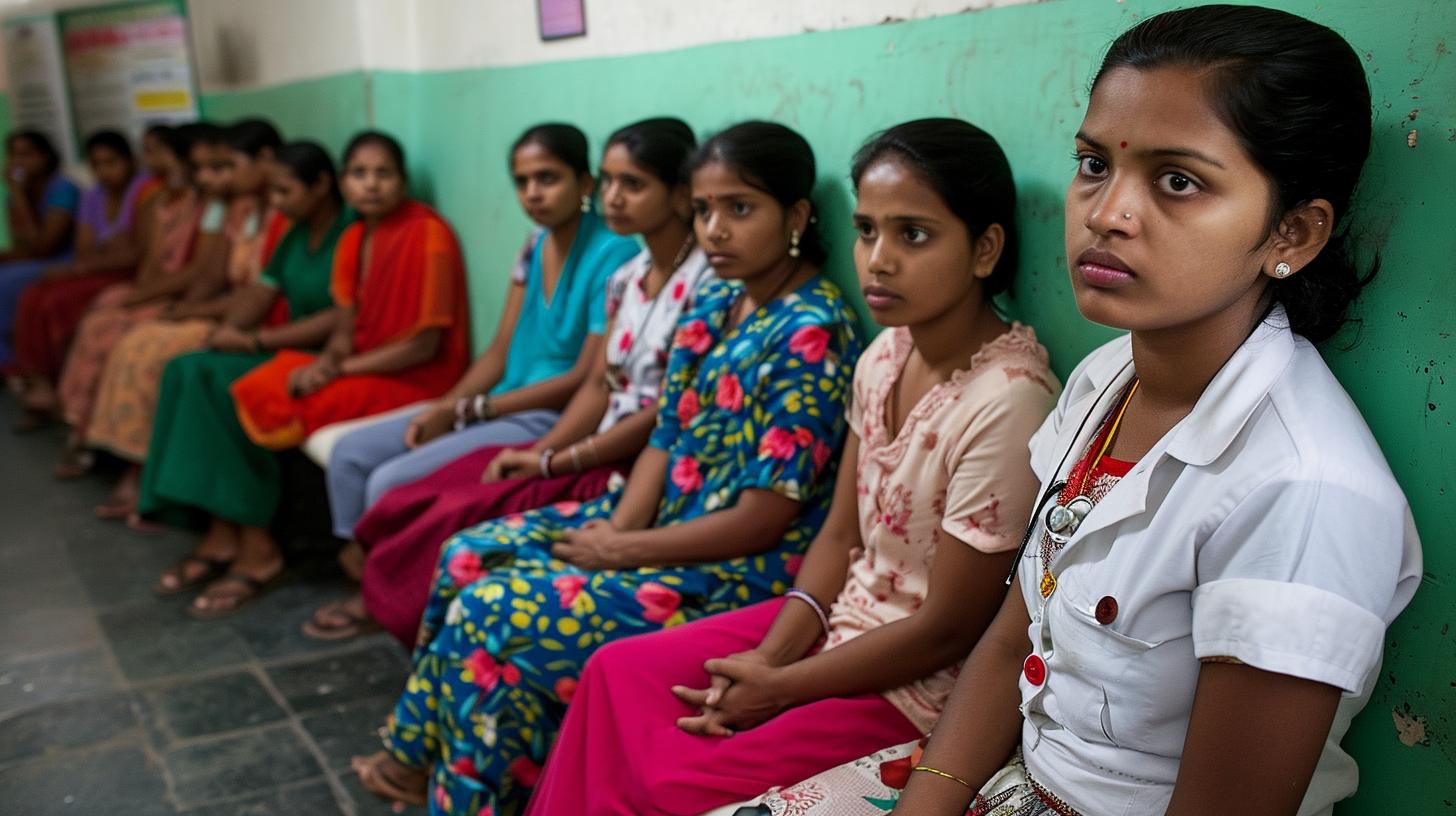
The Health Survey and Planning Committee plays a crucial role in gathering and analyzing data to inform community health planning. This committee is responsible for conducting comprehensive surveys that provide valuable insights into the health needs of the population. By utilizing various research methods, the committee aims to identify key health issues and develop strategies for addressing them.
Health surveys are instrumental in community planning as they help in understanding the current health status, identifying trends, and forecasting future needs. This information is vital for informing policy decisions, resource allocation, and program development. The Health Survey and Planning Committee works closely with stakeholders to ensure that the data collected is accurate and represents the diverse needs of the community.
In this article, we will explore the significance of health surveys in community planning, the role of the Planning Committee in implementing these surveys, key findings from past surveys, challenges faced, strategies for effective data collection and analysis, as well as the impact of survey results on community health programs. We will also discuss future plans and goals for the committee, as well as collaborative efforts with partners to ensure successful survey implementation.
The Importance of Health Surveys in Community Planning
Health surveys play a crucial role in community planning as they provide valuable insights into the health needs and concerns of a population. By gathering data on various health indicators, such as disease prevalence, access to healthcare services, and health behaviors, health surveys help identify areas for improvement and inform the development of targeted interventions and programs.
Identifying Health Priorities
One of the key reasons why health surveys are important in community planning is their ability to identify the most pressing health priorities. By collecting information on a wide range of health issues, from chronic conditions to environmental factors impacting health, surveys help prioritize which issues require immediate attention. This allows the planning committee to allocate resources effectively and tailor interventions to address the specific needs of the community.
Evidence-Based Decision Making
Health surveys provide a solid foundation for evidence-based decision making in community planning. The data collected through surveys offers concrete evidence of the health challenges faced by the community, allowing for informed decisions on resource allocation and program development. This evidence-based approach ensures that interventions are tailored to address real needs and have a higher likelihood of success.
Monitoring Health Trends
Furthermore, health surveys are essential for monitoring health trends over time. By conducting regular surveys, the planning committee can track changes in key health indicators and assess the impact of interventions implemented. This allows for an ongoing evaluation of community health programs and policies, ensuring that they remain effective and relevant to the evolving needs of the population.
Overall, the importance of health surveys in community planning cannot be overstated. They serve as a cornerstone for understanding community health needs, guiding decision making, and monitoring progress towards improved population health. The role of the planning committee in driving successful survey implementation is pivotal in ensuring that these benefits are realized for the betterment of the entire community’s well-being.
The Role of the Planning Committee in Health Survey Implementation
The Health Survey and Planning Committee plays a crucial role in the implementation of health surveys within a community. As the driving force behind the survey process, the committee is responsible for organizing, coordinating, and overseeing all aspects of the survey, from planning to data collection and analysis.
One of the primary responsibilities of the planning committee is to ensure that the health survey is designed in a way that accurately captures the health needs and concerns of the community. This involves working closely with public health experts, local stakeholders, and community members to develop survey questions that address specific health issues and priorities. The committee also plays a key role in identifying target populations for the survey and determining the most effective methods for reaching them.
Furthermore, the planning committee is responsible for mobilizing resources and support for the successful implementation of the health survey. This includes securing funding, recruiting volunteers or staff to assist with data collection, and coordinating with local organizations and institutions to access relevant data and resources. The committee also oversees logistical details such as survey distribution and ensuring compliance with ethical guidelines for research involving human subjects.
Overall, the Health Survey and Planning Committee serves as a critical link between community members, healthcare providers, policymakers, and other key stakeholders. By spearheading efforts to implement comprehensive health surveys that accurately reflect community health needs, the committee plays an essential role in shaping public health initiatives and policies at both local and regional levels.
Key Findings and Insights From Previous Health Surveys
Identification of Health Trends
One of the key findings from previous health surveys conducted by the Health Survey and Planning Committee is the identification of health trends within the community. Through comprehensive data collection and analysis, the committee has been able to pinpoint emerging health issues, changes in disease prevalence, and shifts in healthcare needs. These insights have been crucial in guiding community planning and resource allocation to address these evolving health trends.
Health Disparities and Inequities
Another important insight from previous health surveys is the uncovering of health disparities and inequities within the community. By examining demographic data, socioeconomic factors, and access to healthcare services, the committee has been able to highlight disparities in health outcomes among different population groups. This information has been instrumental in advocating for targeted interventions and policies aimed at reducing these disparities and improving overall community health.
Evidence-Based Decision Making
The findings from past health surveys have provided crucial evidence for decision making in community health programs and policies. The data obtained has enabled stakeholders to make informed decisions regarding public health initiatives, resource allocation, and intervention strategies. By relying on evidence-based insights from the surveys, the Planning Committee has played a vital role in shaping effective approaches to improve community health outcomes.
Overall, the key findings and insights from previous health surveys have laid a strong foundation for evidence-based planning and decision making within the community. These insights have not only helped identify pressing health issues but also guided efforts to address disparities, improve access to care, and promote overall well-being among residents. Moving forward, leveraging these past insights will be essential for continued progress in community health planning and advocacy initiatives led by the Health Survey and Planning Committee.
Challenges Faced by the Planning Committee in Conducting Health Surveys
Health surveys play a crucial role in community planning, providing valuable data and insights that inform the development of health programs and policies. However, conducting these surveys comes with its own set of challenges for the planning committee responsible for their implementation.
One of the primary challenges faced by the planning committee is ensuring accurate and representative data collection. This requires reaching a diverse range of demographics within the community, including marginalized or hard-to-reach populations. Language barriers, cultural differences, and lack of trust in the survey process can all hinder efforts to gather comprehensive data.

In addition to data collection challenges, the planning committee also faces obstacles in ensuring high response rates. Low participation can skew survey results and impact the reliability of findings. Overcoming apathy towards participating in health surveys, as well as addressing privacy and confidentiality concerns, are important considerations for the committee.
Moreover, another significant challenge is securing adequate resources for conducting health surveys. This includes funding for staff training, technology for data collection and analysis, outreach materials, and incentives for survey participants. The planning committee must navigate budget constraints and seek out partnerships to support survey efforts.
Strategies for Effective Data Collection and Analysis in Health Surveys
Data collection and analysis are critical components of successful health surveys conducted by the Health Survey and Planning Committee. Effective strategies in these areas ensure that accurate, valuable information is gathered to guide community health planning and decision-making.
One key strategy for data collection is ensuring the participation of a diverse range of community members. This can be achieved through outreach efforts that target various demographics within the community, including different age groups, socioeconomic backgrounds, and cultural identities. By engaging a broad cross-section of the population, the committee can gather more comprehensive data that reflects the true health needs of the community.
In terms of data analysis, it’s essential for the committee to utilize reliable analytical methods that can effectively interpret and synthesize the collected information. This may involve employing statistical software or partnering with experts in public health research to ensure accurate interpretation of survey results. Additionally, establishing clear protocols for data management and analysis helps maintain the integrity of findings and allows for transparent reporting to stakeholders.
| Data Collection | Data Analysis |
|---|---|
| Engage a diverse range of community members | Utilize reliable analytical methods |
| Conduct outreach targeting different demographics | Employ statistical software or partner with public health research experts |
| Establish clear protocols for data management | Maintain integrity of findings and transparent reporting |
The Impact of Health Survey Results on Community Health Programs and Policies
The results of a health survey conducted by the Health Survey and Planning Committee can have a significant impact on community health programs and policies. The data collected from these surveys provide valuable insights into the prevalent health issues and needs of the community, which in turn helps in the formulation and implementation of targeted programs and policies to address these issues effectively.
For example, a health survey may reveal a high prevalence of chronic diseases such as diabetes or hypertension in a particular neighborhood. Armed with this information, the planning committee can work with local healthcare providers to develop education and prevention programs specifically tailored to address these conditions. Additionally, it can also lead to policy changes at the local government level, such as implementing healthier food options in public places or creating more accessible opportunities for physical activity.
Furthermore, the data gathered from health surveys can also help in identifying disparities in healthcare access and outcomes among different demographic groups within the community. This information is crucial for developing equitable health programs and policies that aim to reduce these disparities and ensure that all members of the community have access to quality healthcare services.

In summary, the impact of health survey results on community health programs and policies is profound. It serves as a catalyst for targeted interventions that address specific health challenges faced by the community, leading to improved overall health outcomes.
| Health Survey Impact | Community Health Programs/Policies |
|---|---|
| Insights into prevalent health issues | Formulation of targeted programs/policies |
| Identification of healthcare disparities | Development of equitable healthcare interventions |
Future Plans and Goals for the Health Survey and Planning Committee
The Health Survey and Planning Committee plays a crucial role in the health and well-being of our community. As we look to the future, it is important for the committee to establish plans and set goals to continue making an impact. Here are some of the future plans and goals for the Health Survey and Planning Committee:
- Expand the Scope of Health Surveys: One of the key goals for the committee is to expand the scope of health surveys conducted within the community. This may include focusing on specific health issues such as mental health, substance abuse, or chronic diseases. By broadening the scope, the committee can gather comprehensive data that will be instrumental in informing future health initiatives and policies.
- Enhance Data Collection Methods: The committee aims to enhance data collection methods by leveraging technology and innovative approaches. This may involve utilizing online surveys, mobile apps, or other digital tools to reach a wider audience and gather more diverse data. Additionally, exploring partnerships with local healthcare providers and institutions will enable more efficient data collection processes.
- Engage Community Stakeholders: In order to ensure that health surveys accurately reflect the needs and concerns of the community, the committee plans to actively engage with various stakeholders including community leaders, healthcare professionals, advocacy groups, and residents. By fostering collaboration and communication, the committee can improve survey participation rates and capture a more comprehensive understanding of community health needs.
As we move forward, it is essential for the Health Survey and Planning Committee to align its future plans and goals with the overarching mission of promoting public health within our community. Through strategic expansion, innovation in data collection methods, and active engagement with stakeholders, the committee will continue to play a pivotal role in guiding community health programs and policies.
Overall, by successfully executing these future plans and goals, the committee will be able to further advance its mission of improving overall community health outcomes through evidence-based decision-making. Additionally reaching these objectives will also solidify its position as a vital resource for guiding sustainable public health initiatives within our community.
Collaborations and Partnerships for Successful Health Survey Implementation
The success of health surveys in community planning heavily relies on collaborations and partnerships with various stakeholders. These collaborations are essential for ensuring the successful implementation of the survey, as well as the utilization of its results for future planning and policy-making. The Health Survey and Planning Committee recognizes the importance of building strong relationships with different organizations, agencies, and community groups to achieve their goals effectively.
Some key partnerships that have been instrumental in previous health surveys include:
- Local healthcare providers and hospitals
- Non-profit organizations focused on public health
- Educational institutions for research support
- Government agencies for funding and support
These partnerships have not only provided crucial resources and expertise but also helped in engaging a wider segment of the community in the survey process. By collaborating with various entities, the Planning Committee has been able to reach diverse populations, gather comprehensive data, and ensure that the survey results are used to address the specific health needs of different communities within their jurisdiction.
Moving forward, the Health Survey and Planning Committee aims to expand its network of partners to include more grassroots organizations, indigenous groups, and other underrepresented communities. This inclusive approach will not only enhance the accuracy and relevance of the survey data but also foster a greater sense of ownership and empowerment among these communities.
The committee understands that by working hand-in-hand with a wide range of partners, they can create more impactful initiatives that truly address the health challenges faced by all members of their community.
Conclusion
In conclusion, the Health Survey and Planning Committee plays a crucial role in gathering essential data for community health planning and improvement. The importance of health surveys in community planning cannot be overstated, as they provide valuable insights into the health needs of the population and help guide the development of effective health programs and policies. The Planning Committee’s role in implementing these surveys is essential, ensuring that data collection is systematic and accurate.
The key findings from previous health surveys have provided valuable insights into the prevalent health issues within our community, allowing the Planning Committee to identify priority areas for intervention. However, it is important to acknowledge the challenges faced by the committee in conducting these surveys, such as limited resources and participation. Overcoming these challenges requires strategic planning and collaboration with various stakeholders, including local community organizations and healthcare providers.
Moving forward, the Health Survey and Planning Committee aims to strengthen collaborations and partnerships for successful survey implementation. By actively involving the community in advocacy efforts and fostering participation in survey activities, the committee can ensure that the survey results accurately reflect the health needs of the population. Ultimately, community participation and advocacy are integral to the success of health surveys, shaping future health programs and policies that address the most pressing health issues in our community.






